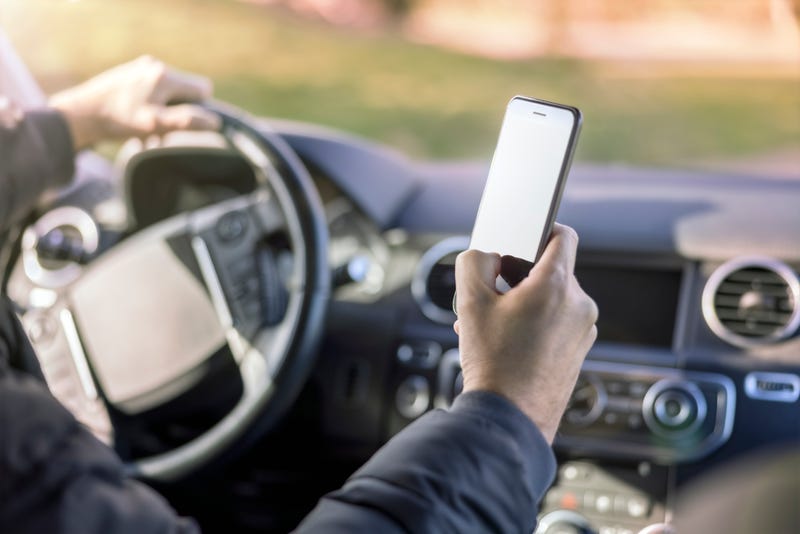
(WWJ) – Back in 2010 Michigan passed a law outlawing texting and driving. But because it was so specific, the law had limitations.
That’s why this Friday, June 30, a new distracted driving law goes into effect statewide, placing more restrictions on what drivers in Michigan can and can’t do behind the wheel. On a new Daily J podcast, WWJ’s Zach Clark finds out what’s different in the new law and how that impacts drivers.
What’s different under the new law?
While texting and driving has been against the law for more than a decade, the newly passed law makes it illegal to “use a mobile electronic device to do any task, including, but not limited to” the following:
• Make or receive a phone call
• Send, receive or read a text message
• View, record or transmit a video
• Access, read or post to a social media site
In essence, Michigan lawmakers have expanded the law to “take the phone out of people’s hands completely,” according to Brandon Hewitt, lawyer and Chief Operating Officer of Michigan Auto Law.
The law makes holding or using a cell phone while driving a primary offense -- meaning an officer could pull someone over and ticket them for this offense. The new legislation specifically states, however, that police would not be allowed to search a driver solely because of this violation.
The legislation defines holding a cell phone or electronic device as physically supporting it with “any part of the hands, arms or shoulders,” according to the state website.
What if you’re at a stoplight or stop sign?
The new laws apply anytime you’re behind the car – even if you’re stopped.
“Even if you’re at a stoplight or stop sign, you still cannot touch your phone,” Michigan State Police First Lt. Mike Shaw said. “You can’t grab it, do anything with it just because you’re stopped in traffic. That’s one of the big changes from the old law.”
Shaw says that’s in part because taking your eyes off the road or hands off the wheel makes you “want to take your brain off what you’re doing, which is driving.”
How will the new law be enforced?
Drivers caught violating the rules would face fines and/or be required to perform community service.
If a person is caught holding or using a cell phone, or mobile electronic device, while driving a regular motor vehicle, they would face the following fines:
• First violation: $100 fine or 16 hours of community service, or both.
• Second or subsequent violation: $250 fine or 24 hours of community service, or both.
• If 3 violations occur within a 3-year period: The driver would be ordered by the court to complete a drive-improvement course.
If a person driving a commercial vehicle or a school bus is caught holding or using a cell phone, they would face the following fines:
• First violation: $200 fine or 32 hours of community service, or both.
• Second or subsequent violation: $500 fine or 48 hours of community service, or both.
Under the legislation, if a crash were to occur and the at-fault driver was holding or using a cell phone while driving, any civil fines would be doubled.
Are there exceptions to the law?
Lawmakers did include the following exceptions for the law:
• Law enforcement, first responders, and other emergency workers would not be prohibited from using a cell phone while performing official duties.
• The same exception goes for anyone calling or texting 911 to report an emergency or seek help.
•Drivers will still be allowed to use their GPS, but only if it's hands-free. Phones could be used as navigation systems so long as it is in a hands-free fashion, such as mounting it to the dashboard or using voice commands to control it.
• Generally, using voice commands or hands-free modes to use mobile electronic devices is allowed.
What else should drivers avoid while behind the wheel?
While Kiefer Foundation founder Steve Kiefer says “cell phone usage is the primary cause of distracted driving,” there are other dangerous behaviors officials say should be avoided while driving. They include:
• Eating, drinking, or smoking
• Grooming
• Looking after children or pets
• Chatting with passengers
• Searching or reaching for an item
• Looking at crashes or roadside sights
• Checking a navigation system
• Reading anything, including maps
• Adjusting climate or music controls
• Listening to loud music
Want more of The Daily J? Just text WWJ to 20357 to get the podcast delivered to your phone or tablet for free, every Monday-Friday. And be sure to subscribe. Msg and data rates apply.



